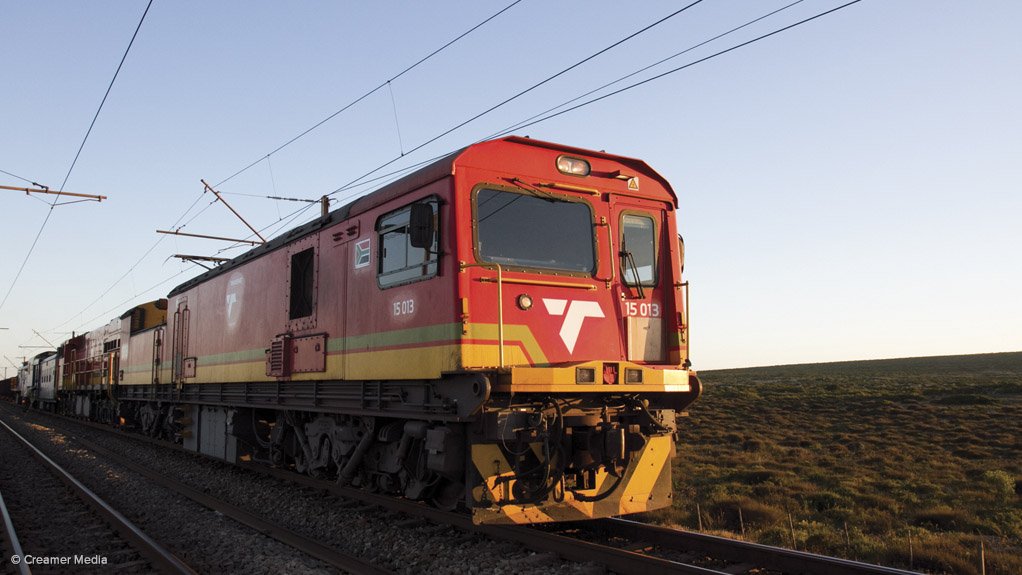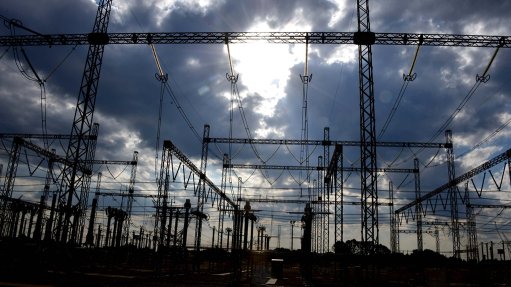TFR undertaking initiatives to address constraints, outgoing CEO says


Transnet Freight Rail is facing a shortage of operational locomotives owing to unavailability of parts and spares for maintenance
Photo by Creamer Media
Transnet Freight Rail (TFR), as a division of Transnet, is affected by three major constraints hampering the entity; however, there are initiatives under way to mitigate this and some progress is being made to rectify the considerable challenges, outgoing TFR CE Siza Mzimela said on October 5.
She was delivering one of the keynote addresses during the second day of the Joburg Indaba.
Her address was delivered soon after news emerged that she had resigned from TFR. Addressing the issue at the Indaba, Mzimela said it was a “personal decision, as when things change, you decide whether you align or not”.
Her resignation followed only days after Transnet CEO Portia Derby announced her departure from the embattled State-owned group amid growing concerns about the deterioration of the enterprise.
Mzimela said the first constraint facing TFR – theft and vandalism – entailed cable and signalling theft, which resulted in trains having to resort to manual authorisation, thereby causing delays.
Mzimela pointed out that security incidents increased by 138% between 2017/18 and 2022/23.
The second constraint relates to locomotives, with the entity facing a shortage of operational locomotives owing to unavailability of parts and spares for maintenance, owing to issues with the Chinese supplier when the contract was cancelled.
This has been a contentious issue and entailed a high-level delegation, including Public Enterprises Minister Pravin Gordhan, being sent to China to try and resolve it.
Mzimela said that, since she spoke at the previous Joburg Indaba, some progress had been made, with two outstanding issues around the South African Revenue Services and the South Africa Reserve Bank needing to be resolved before the necessary parts and spares could be secured.
Mzimela added that, in terms of rolling stock, TFR’s available locomotives were reduced by 33% overall from 2017/18 to 2022/23; and volumes reduced by 31% in this period in correlation to the reduced locomotives.
She also pointed out that about half of the TFR business was exposed to a legacy locomotive fleet with age-related reliability and viability challenges.
Further, the third constraint related to infrastructure, with TFR having limited slot capacity owing to restrictions on the network.
Mzimela elaborated that systematic underinvestment had resulted in an increased maintenance backlog owing to limited funds.
Mzimela also mentioned that increasing climate-related incidents were diverting funding meant for routine maintenance to emergency unforeseen maintenance, with the total cost of weather- and climate-related incidents for 2022/23 to 2023/24, to date, sitting at R4.7-billion.
However, she highlighted that there were initiatives under way to restore and increase infrastructure capacity.
This includes assessing the existing rail infrastructure thoroughly and using this to guide strategies and investment decisions, as well as develop long-term plans to restore and expand the rail infrastructure.
There is also securing funding through various sources, prioritising projects through a framework to ensure proper and expeditious resource allocation; and ongoing monitoring and evaluating of long-term plans and the network and adapting these as required.
Moreover, there was a need to expand capacity, embrace technology, collaborate with stakeholders, be cognisant of environmental considerations when restoring and upgrading rail infrastructure, using sustainable design practices, and lastly, to upgrade and modernise existing infrastructure.
Mzimela also outlined targeted capacity expansion initiatives. For coal, export coal was currently capacitated to 60-milllion tonnes a year, with this constrained by limited locomotive availability.
Mzimela said that exports were to increase to 79-milllion tonnes a year and expansion of up to 81-million tonnes a year would be unlocked by Eskom power upgrades.
There are four capacity expansion projects under way for coal.
For manganese, TFR has completed three expansion projects; and has a further five under way.
For the latter, one was announced just last week in terms of the East London Terminal, and Mzimela averred that the entity sees considerable potential for this resource.
For chrome and magnetite, one capacity expansion project has been completed and another seven are under way.
Mzimela emphasised the importance of collaboration with the private sector, and engaging with customers to ensure that they understood the issues, what was being done to address these, and how they could contribute.
Kumba Iron Ore CEO Mpumi Zikalala affirmed that it was good that there was collaboration between business and the State on the issues of energy, logistics, and crime and corruption, highlighting the importance of the National Logistics Crisis Committee, especially, as a measure for tackling the logistics constraints.
Afrimat CEO Andries van Heerden said the company had been working “ahead of the curve” in collaborating with Transnet to seek solutions to specific problems affecting its commodities and while some progress had been realised, more needed to be done to bolster capacity.
Zikalala reiterated this, positing that the country was uniquely positioned with its very high-grade manganese and iron-ore to meet global demand, if it could unlock logistical constraints.
Article Enquiry
Email Article
Save Article
Feedback
To advertise email advertising@creamermedia.co.za or click here
Press Office
Announcements
What's On
Subscribe to improve your user experience...
Option 1 (equivalent of R125 a month):
Receive a weekly copy of Creamer Media's Engineering News & Mining Weekly magazine
(print copy for those in South Africa and e-magazine for those outside of South Africa)
Receive daily email newsletters
Access to full search results
Access archive of magazine back copies
Access to Projects in Progress
Access to ONE Research Report of your choice in PDF format
Option 2 (equivalent of R375 a month):
All benefits from Option 1
PLUS
Access to Creamer Media's Research Channel Africa for ALL Research Reports, in PDF format, on various industrial and mining sectors
including Electricity; Water; Energy Transition; Hydrogen; Roads, Rail and Ports; Coal; Gold; Platinum; Battery Metals; etc.
Already a subscriber?
Forgotten your password?
Receive weekly copy of Creamer Media's Engineering News & Mining Weekly magazine (print copy for those in South Africa and e-magazine for those outside of South Africa)
➕
Recieve daily email newsletters
➕
Access to full search results
➕
Access archive of magazine back copies
➕
Access to Projects in Progress
➕
Access to ONE Research Report of your choice in PDF format
RESEARCH CHANNEL AFRICA
R4500 (equivalent of R375 a month)
SUBSCRIBEAll benefits from Option 1
➕
Access to Creamer Media's Research Channel Africa for ALL Research Reports on various industrial and mining sectors, in PDF format, including on:
Electricity
➕
Water
➕
Energy Transition
➕
Hydrogen
➕
Roads, Rail and Ports
➕
Coal
➕
Gold
➕
Platinum
➕
Battery Metals
➕
etc.
Receive all benefits from Option 1 or Option 2 delivered to numerous people at your company
➕
Multiple User names and Passwords for simultaneous log-ins
➕
Intranet integration access to all in your organisation

















